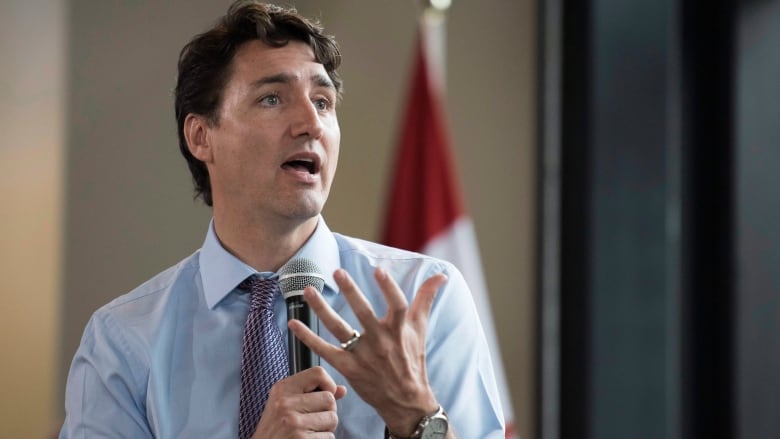Rights groups and opposition urge Liberals to help those fleeing anti-LGBT violence in Chechnya
'When they're returned by the security forces to their families, their families are encouraged to kill them'

The torture and imprisonment of dozens of gay and bisexual men in Chechnya is an emergency of "unprecedented magnitude" that requires an escalated response from Western leaders, including Prime Minister Justin Trudeau, Human Rights Watch says.
"Canada has a great moral position on these issues," said Kyle Knight, a LGBT program researcher at the New York-based global rights watchdog.
While Canadian Foreign Affairs Minister Chrystia Freeland issued a statement earlier in April calling on Russia to investigate reports of human rights abuses in its Chechen region, Knight said Trudeau himself needs to speak out about the "clear campaign" by local police and security forces, targeting gay and bisexual men.
Human Rights Watch workers have interviewed LGBT people who have escaped Chechnya and verified the original claims of abuse reported by Novaya Gazeta, a Russian independent newspaper, Knight said.

Human Rights Watch believes up to 200 men were rounded up, put in "informal and unlawful detention centres," tortured and humiliated, starting in late February. The group also believes at least three men have died — two from in-custody torture and one from a "so-called honour killing" by his family.
"When they're returned by the security forces to their families, their families are encouraged to kill them," Knight said.
"Here you have torture survivors who have physical scars, and the worst part of it for them is that they know it is very, very far from over," he said. "The people who are closest to them, the people they live with, the people they've grown up with, are the ones who are now being told to turn on them and continue this abuse over time."
Can't 'breathe easy' until out of Russia
The orders are widely believed to be coming directly from Chechnya's leader, Ramzan Kadyrov, although he has denied the persecution is happening. A spokesperson for Russian President Vladimir Putin has said the Kremlin has no reason to doubt Kadyrov, as no one has publicly come out as a victim yet.

Rights activists and Chechnya experts say it is improbable that any gay person will ever come out publicly as a victim of harassment and torture because of deep-seated homophobia in the region.
Even those who have managed to escape the region are still not safe, said Knight, because they face persecution elsewhere in Russia now that they've been outed.
"They're really not going to be able to breathe easy until they get out of the country," he said.
In addition to putting political pressure on Putin to guarantee the safety of LGBT people in the Chechen region and throughout Russia, Knight said, Canada also has a role to play through its resettlement program.
"Countries that take in refugees need to take asylum claims from Chechen gay people extremely seriously in the coming months, because that's going to be the pragmatic response to all the politics of the situation."
'It's a no-brainer'
Rainbow Railroad, a Toronto-based charity that has helped LBGT people escape persecution in the Caribbean, Africa and the Middle East, said in a statement it is now working with the Russian LGBT Network to "identify individuals who need to be evacuated — with Rainbow Railroad providing direct travel assistance."
At this point, they are working with about 30 gay or bisexual Chechen men trying to leave Russia, Kimahli Powell, executive director of Rainbow Railroad, told CBC News.
His organization is hoping to work with the Canadian government to find a way to give them refuge.

Because Chechnya is a largely Muslim republic, current immigration and refugee policies under U.S. President Donald Trump make it unlikely they would be granted asylum south of the border, Powell said.
"We think this is an opportunity for Canada to take a lead role in helping."
In a statement to CBC News, Immigration, Refugees and Citizenship Canada did not specifically mention Chechnya, saying it "cannot speculate on any future policy."
"Those in need of legal and/or physical protection, such as individuals from the LGBTQ2 community, are considered as one of the vulnerable groups Canada resettles," it said.
"Canada relies on the UNHCR, other referral organizations and private sponsors to refer cases in need of resettlement," it said. "Vulnerability is one of the key factors used by UNHCR to identify refugees for resettlement to Canada."
However, the statement also said, "in order to be considered for resettlement, individuals must be outside their country of origin," suggesting a potential difficulty if Chechen asylum-seekers are still in Russia.
The Liberal government is also facing calls to do more from both opposition parties.
"It's a no-brainer," Conservative MP Michelle Rempel told CBC News on Thursday.
There's no reason the federal government can't act quickly to provide asylum to the Chechens, she said, because Canada has a long history of being able to provide emergency resettlement when people are in "immediate danger."

Such a decision requires "political will," Rempel said, adding that the prime minister should speak out himself against the human rights abuses.
The NDP has also called on the government to offer asylum to LGBT people fleeing Chechnya.
"The Liberals must not only condemn the Chechen government's action, they should also extend Canadian protections to the men escaping these human rights violations," said NDP immigration critic, Jenny Kwan, in a statement issued earlier this month.
CBC News asked the Prime Minister's Office if Trudeau would be speaking out about the Chechnya issue.
In an email on Thursday morning, the PMO said that "as this is a global affairs issue," the inquiry should be directed to the press secretary for the minister of foreign affairs.
With files from The Associated Press

